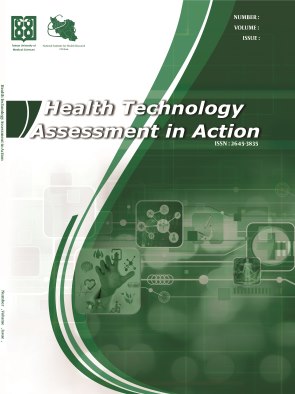Evaluation of the Overall Quality of the Health Technology Assessment Educational Program from the Perspectives of University Professors and Learners in Iran
Abstract
Background: Failure to evaluate, examine, assess the requirements, and determine the quality level of the curriculum of educational fields will result in low-quality and obsolete curricula. It will prevent the academic areas from achieving their goals. Therefore, this study evaluates the overall quality of Iran's Health Technology Assessment (HTA) curriculum from the perspectives of instructors and students.
Methods: The study was conducted with 127 instructors, students, and Health Technology Assessment (HTA) graduates at Tehran, Iran, Kerman, and Yazd Universities of Medical Sciences. A researcher-made questionnaire did the data collection. Cronbach's alpha coefficient for the entire questionnaire was 91%, and the intra-domain correlation coefficient was 87%, indicating that the instrument is appropriate. The data were analyzed with descriptive and analytical tests based on the normality or non-normality of the test using ANOVA, Kruskal-Wallis, two-way ANOVA, and the Friedman.
Results: This research was completed by 114 of 127 participants. According to a review of diverse perspectives, the quality of the educational program in terms of design elements in special courses and executive elements in compensatory courses falls within the range of average (3.66 > mean > 2.33) or average (3.66 > mean > 2.33), to good (mean > 2.33). In addition, the majority of executive elements from special courses and design elements from compensatory classes are in an unfavorable position, with a mean>1.66 to average (3.66> mean >2.33).
Conclusions: Problems and inadequacies are observed in a few curriculum implementation elements. Therefore, modifications should be made to remedy the inappropriate details and remove implementation obstacles to enhance the interested groups' capability and practical skills.
2. Sivalal S. Health technology assessment in the Asia Pacific region. International Journal of Technology Assessment in Health Care. 2009 Jul;25(S1):196-201.
3. Majdzadeh SR, Yazdizadeh B. Comprehensive book of public health, chapter 14. Speech 7 (Evaluation of health technology), pp 2217-2222.
4. Morteza Arab-Zozani.et al. He Attitude of Health Technology Assessment Students to Their Field of Study and Future Career in Iran. International Journal of Epidemiologic Research. 2017 Summer; 4(3):227-231.
5. Rezaei Z, Ramazanzade K, Abbaszadeh H. The degree of compliance of the content of the general dentistry curriculum with job needs from the perspective of dentists in Birjand. Iranian Journal of Medical Education 2021; 21 :68-81
6. Altbach, P (1988).Comparative Studies in Higher Education in: Postlethwaite; in (ed). The Encyclopedia of comparative Education and National System of Education, pp 6- 7.
7. Klein, M.F. Curriculum Design. International Encyclopedia of Education: Curriculum Studies. Volume II. Husen, T. and Postlethwaite editors, Pergamon Press: Oxford England, 1985, pp. 1163-1170.
8. Sanyal BM. Quality Assurance and the Role of Accreditation: An overview. Chicago: Ibid; 2007.
9. Khaghanizadeh M, Fathi-Vajargah K. Patterns of academic curriculum.Baqiyatallah Med Educ h. 2004; 1(2):9-11.
10. Bridges, D (2000). The higher education curriculum 21 set century, Cambridge.Journal of Education combridge. 7 (2). 122- 145.
11. Fathi K, Shafiei N. Evaluating quality of university curriculum. Journal of Curriculum Studies 2008; 5: 1-26.
12. Akker, J.H Vanden. (2003). Curriculum persective: An Introduction. Dordrecht: Kluwer Academic Publisher.
13. Douw etal. Hta education and training in europe. International Journal of Technology Assessment in Health Care, 18:4 (2002), 808–819.
14. Lehoux etal. International Master’s Program in health technology assessment and management: Assessment of the first edition (2001–2003). International Journal of Technology Assessment in Health Care, 21:1 (2005), 104–112
15. Yazdani M, Rezvani A, Vafamehr M, Khademzade MH. Evaluation of Architectural Engineering Curriculum to Promote Vocational Education Based on Klein Model. Creative City Design. 2022 Jan 1;5(1):45-61.
16. Rezaei Z, Ramazanzade K, Abbaszadeh H. The degree of compliance of the content of the general dentistry curriculum with job needs from the perspective of dentists in Birjand. Iranian Journal of Medical Education. 2021 Apr 10;21:68-81.
17. Nejatifar F, Gharib S, Monfared A, Shenavar I, Alavi A, Hojjati A, Abasi Ranjbar Z, Yaseri M, Mahdi F, Ramezanzadeh E, Tangestaninezhad A, Javanak M. The Impact of Components of Organizational Culture on components of the Faculty Members᾽ Development.RME; 2022;14 (1):79-88.
| Files | ||
| Issue | Vol 7, No 1 (2023) | |
| Section | Articles | |
| DOI | https://doi.org/10.18502/htaa.v7i1.13301 | |
| Keywords | ||
| Health Technology Assessment (HTA) Educational Program Evaluation | ||
| Rights and permissions | |

|
This work is licensed under a Creative Commons Attribution-NonCommercial 4.0 International License. |




